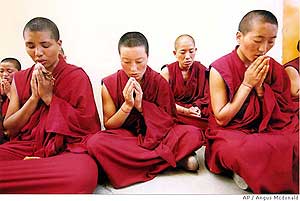Buddhist AI Chat Bot NORBU!
(Neural Operator for Responsible Buddhist Understanding)
For Malaysians and Singaporeans, please make your donation to the following account:
Account Name: Bodhi Vision
Account No:. 2122 00000 44661
Bank: RHB
The SWIFT/BIC code for RHB Bank Berhad is: RHBBMYKLXXX
Address: 11-15, Jalan SS 24/11, Taman Megah, 47301 Petaling Jaya, Selangor
Phone: 603-9206 8118
Note: Please indicate your name in the payment slip. Thank you.
Dear Friends in the Dharma,
We seek your generous support to help us train NORBU, the word's first Buddhist AI Chat Bot.
Here are some ways you can contribute to this noble cause:
One-time Donation or Loan: A single contribution, regardless of its size, will go a long way in helping us reach our goal and make the Buddhist LLM a beacon of wisdom for all.
How will your donation / loan be used? Download the NORBU White Paper for details.
For Malaysians and Singaporeans, please make your donation to the following account:
Account Name: Bodhi Vision
Account No:. 2122 00000 44661
Bank: RHB
The SWIFT/BIC code for RHB Bank Berhad is: RHBBMYKLXXX
Address: 11-15, Jalan SS 24/11, Taman Megah, 47301 Petaling Jaya, Selangor
Phone: 603-9206 8118
Note: Please indicate your purpose of payment (loan or donation) in the payment slip. Thank you.
Once payment is banked in, please send the payment slip via email to: editor@buddhistchannel.tv. Your donation/loan will be published and publicly acknowledged on the Buddhist Channel.
Spread the Word: Share this initiative with your friends, family and fellow Dharma enthusiasts. Join "Friends of Norbu" at: https://www.facebook.com/groups/norbuchatbot. Together, we can build a stronger community and create a positive impact on a global scale.
Volunteer: If you possess expertise in AI, natural language processing, Dharma knowledge in terms of Buddhist sutras in various languages or related fields, and wish to lend your skills, please contact us. Your knowledge and passion could be invaluable to our project's success.
Your support is part of a collective effort to preserve and disseminate the profound teachings of Buddhism. By contributing to the NORBU, you become a "virtual Bodhisattva" to make Buddhist wisdom more accessible to seekers worldwide.
Thank you for helping to make NORBU a wise and compassionate Buddhist Chatbot!
May you be blessed with inner peace and wisdom,
With deepest gratitude,
Kooi F. Lim
On behalf of The Buddhist Channel Team
Note: To date, we have received the following contributions for NORBU:
US$ 75 from Gary Gach (Loan)
US$ 50 from Chong Sim Keong
MYR 300 from Wilson Tee
MYR 500 from Lim Yan Pok
MYR 50 from Oon Yeoh
MYR 200 from Ooi Poh Tin
MYR 300 from Lai Swee Pin
MYR 100 from Ong Hooi Sian
MYR 1,000 from Fam Sin Nin
MYR 500 from Oh teik Bin
MYR 300 from Yeoh Ai Guat
MYR 300 from Yong Lily
MYR 50 from Bandar Utama Buddhist Society
MYR 1,000 from Chiam Swee Ann
MYR 1,000 from Lye Veei Chiew
MYR 1,000 from Por Yong Tong
MYR 80 from Lee Wai Yee
MYR 500 from Pek Chee Hen
MYR 300 from Hor Tuck Loon
MYR 1,000 from Wise Payments Malaysia Sdn Bhd
MYR 200 from Teo Yen Hua
MYR 500 from Ng Wee Keat
MYR 10,000 from Chang Quai Hung, Jackie (Loan)
MYR 10,000 from K. C. Lim & Agnes (Loan)
MYR 10,000 from Juin & Jooky Tan (Loan)
MYR 100 from Poh Boon Fong (on behalf of SXI Buddhist Students Society)
MYR 10,000 from Fam Shan-Shan (Loan)
MYR 10,000 from John Fam (Loan)
MYR 500 from Phang Cheng Kar
MYR 100 from Lee Suat Yee
MYR 500 from Teo Chwee Hoon (on behalf of Lai Siow Kee)
MYR 200 from Mak Yuen Chau
We express our deep gratitude for the support and generosity.
If you have any enquiries, please write to: editor@buddhistchannel.tv

 << Tibetan nuns in Dharamsala pray Sept. 12, 2001, for the victims of terrorist attacks in the United States one day earlier. Associated Press file photo by Angus Mcdonald
<< Tibetan nuns in Dharamsala pray Sept. 12, 2001, for the victims of terrorist attacks in the United States one day earlier. Associated Press file photo by Angus Mcdonald